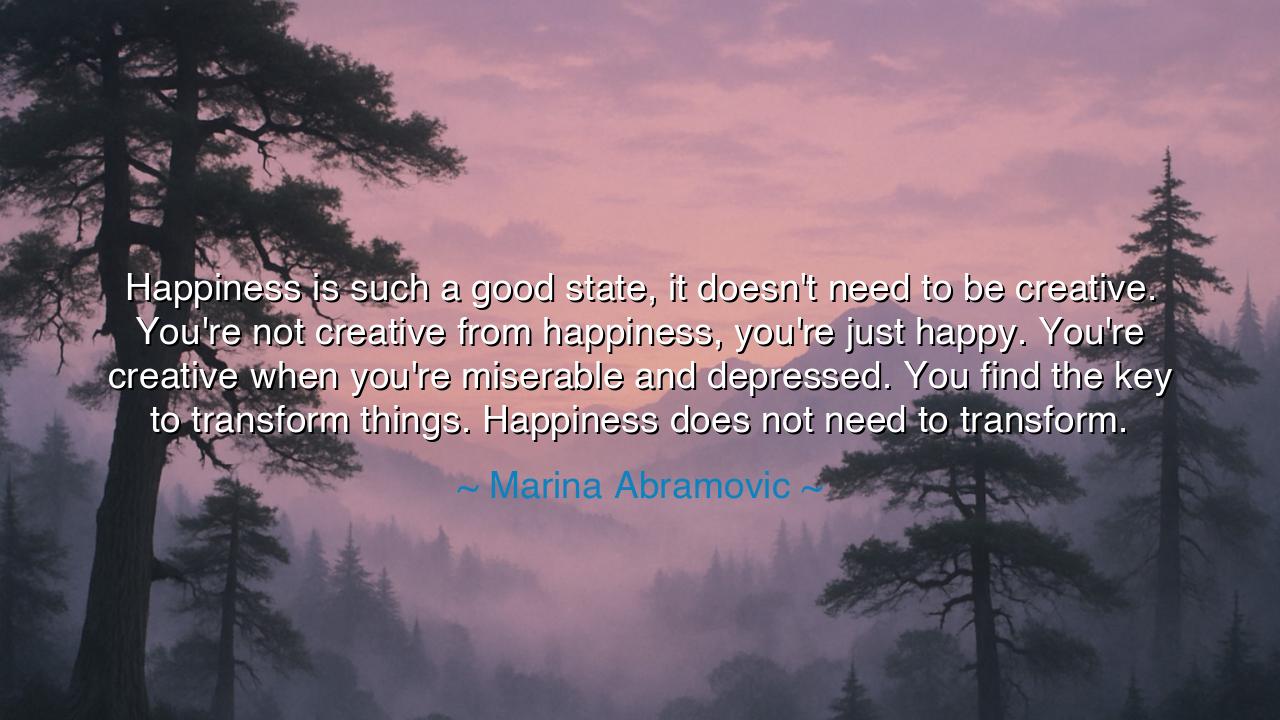
Happiness is such a good state, it doesn't need to be creative.
Happiness is such a good state, it doesn't need to be creative. You're not creative from happiness, you're just happy. You're creative when you're miserable and depressed. You find the key to transform things. Happiness does not need to transform.






In the words of Marina Abramović, “Happiness is such a good state, it doesn't need to be creative. You're not creative from happiness, you're just happy. You're creative when you're miserable and depressed. You find the key to transform things. Happiness does not need to transform,” there lies a truth that has burned quietly through the hearts of artists, poets, and seekers since time immemorial. These words do not glorify pain — they reveal its secret power. Abramović, the great pioneer of performance art, speaks not as a philosopher gazing from afar, but as one who has walked through the desert of despair and found, within it, the alchemy of creation. Her voice is the voice of the ancients — reminding us that out of suffering, the soul finds its way to transformation.
The origin of this quote lies in Abramović’s lifelong exploration of endurance, vulnerability, and the boundaries between the body and the spirit. In her art, she faced pain directly — fasting, isolating, enduring exhaustion — to strip away illusion and confront the raw essence of being. Her belief that creativity springs from misery is born from experience: she discovered that the mind in happiness rests content, while the mind in sorrow seeks meaning, wrestles with form, and gives birth to new understanding. Happiness is complete; it desires nothing. But suffering, though cruel, demands transformation — and from that demand, creation is born.
The ancients understood this well. The Greek tragedians, from Euripides to Sophocles, wrote of heroes who suffered not for punishment, but for revelation. Their agony was the crucible through which wisdom emerged. Prometheus, chained for giving fire to mankind, became the symbol of the artist — one who endures torment to bring light to the world. Abramović echoes this mythic lineage: the belief that in the moments of greatest darkness, the human spirit, unwilling to perish, transforms pain into beauty. From grief arises poetry; from loss, music; from despair, vision. The seed must break before it can sprout.
Consider the life of Vincent van Gogh, whose name shines now with eternal radiance. He painted not in comfort, but in anguish — each stroke a cry of the soul. His sunflowers, his swirling skies, were not the works of a happy man but of one who wrestled with his own demons. His art was a bridge between despair and transcendence. He found the key, as Abramović says, “to transform things” — to turn his internal torment into color, movement, and light. His life was tragedy; his art, resurrection. This is the sacred paradox she speaks of: that misery, when faced with courage, becomes the mother of meaning.
Yet Abramović’s words also carry a quiet peace — a recognition that happiness is not lesser, only different. “Happiness does not need to transform,” she says, because happiness is already whole. In joy, there is no hunger to create; the spirit rests, satisfied in the simple presence of being. The river does not carve the mountain when it flows gently — only when storms and floods surge does it reshape the land. So, too, with the soul: in happiness, we live; in suffering, we shape. Both are divine. One nourishes the heart; the other forges it.
This truth must not be misread — for it is not an invitation to seek suffering, but to transform it when it comes. Life will deliver pain unbidden, as it has to every being since the dawn of time. But when it arrives, one may choose either despair or creation. The wise — the artist, the thinker, the brave of spirit — will use that pain as clay for the hands of the soul. They will not drown in sorrow but shape from it something eternal. As the mystic poet Rumi wrote, “The wound is the place where the light enters you.”
Let this, then, be the lesson: do not curse your suffering; let it teach you. When joy fills your days, rest in it with gratitude. When sorrow visits your heart, face it with courage, and ask: What can I make of this? For every heartbreak, every failure, every dark night of the soul holds within it a spark of transformation. To live fully is to know both the calm of happiness and the fire of struggle — and to honor each for what it brings.
So, as Marina Abramović teaches, happiness is the reward of peace, but creativity is the child of struggle. The wise soul walks the middle path — rejoicing in joy when it comes, but not fearing pain when it returns. For in both, life whispers its deepest truths. And when you emerge from your darkness bearing something beautiful — a song, a vision, an act of kindness — you will have learned the greatest art of all: the art of transformation.






AAdministratorAdministrator
Welcome, honored guests. Please leave a comment, we will respond soon